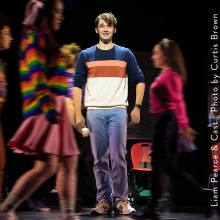
Full Synopsis
Act One
In an elaborate, eighteenth-century, Greco-French topiary labyrinth in Sparta, we find Hesione, a stern philosopher, and her beautiful young nephew, Agis. Today is the day that they have been waiting for, the day when Agis will kill the wicked Princess Leonide, who stole their kingdom. Hesione's valet ,Harlequin, and her gardener, Dimas, arrive to report that Hermocrates, Hesione's brother and Sparta's most diligent philosopher, is planning Agis' trip. Harlequin and Dimas are overjoyed at the prospect of the trip as an escape from their sedate masters. Hermocrates enters and arms Agis for the trip. They all praise the impending death of Leonide, the devil's spawn ("This Day of Days").
As they exit, a beautiful young woman enters, unseen by them: it is Princess Leonide, followed by her wisecracking maid, Corine. The Princess has a heroic crush on Agis, not knowing that his sole mission in life is to kill her. She wants her man and she will do anything for love ("Anything"). Knowing that women – other than Hesione – are strictly forbidden in the garden, Leonide and Corine dress up as men, Phocion and Troy. As they practice their manly poses, Harlequin arrives and introduces himself ("Classic Clown"). Harlequin immediately discovers that they are women. The Princess explains that she wants to woo Agis, and he, struck by her sincerity, agrees to help. Dimas arrives, complaining about a gardener's life ("Murrga #1"). Agis enters and is immediately impressed with Phocion's noble and refined visage. Corine and Harlequin exit, having been abruptly affected by one another. Agis and the disguised Princess vow to be faithful friends ("The Bond That Can't Be Broken"). She implores him to arrange a meeting for her with Hermocrates. He agrees and, moved by their friendship, reveals what he has never told another soul: that he is the true Prince of Sparta. She is shocked. He explains the whole story of how his parents were killed and the kingdom lost, stolen by the ruthless Leonide. He asks her to renounce all passion and to be guided solely by logic. She must also swear to kill Leonide! Out of her love for him, she agrees.
Corine and Harlequin reenter decrying the vicissitudes of love; Corine much prefers passion ("Mr. Right"). Hesione and Dimas appear on the other side of the garden. Princess Leonide, as Phocion, entreats Hesione to allow her to have an audience with Hermocrates. When Hesione refuses, Leonide feigns a passionate love for her ("You May Call Me Phocion"). Hesione is flustered, but titillated, and agrees to send Phocion to Hermocrates. Corine and Dimas engage in a little verbal sparring that degenerates into a wrestling match, during which Dimas discovers Corine's true sex. Corine reveals that her mistress loves Agis. She tries to seduce Dimas and is surprised by her success ("Mr. Right – Reprise"). They leave together.
The princess reappears and finds Hermocrates. She expresses her desire to take up the life of the mind, under his tutelage. He warns her of the rigors of such a life and cautions her regarding the unsavory nature of the heart ("Emotions"). He sees through her disguise and realizes her true gender. She claims to be Aspasie, a young woman who wants to learn to be more like men, and proclaims that her admiration for Hermocrates goes beyond his mind. Through her advances, his passion begins to swell, and witnessing her efforts bear fruit, she leaves him wanting more. Hermocrates tells Dimas to follow "him" and keep him away from Agis. Hesione arrives and asks Hermocrates to take Phocion as a pupil. He refuses, so they leave.
The princess and Agis arrive as Agis explains his hate for the odious sex that goads men to love. He tells her that he is off today to seek out and kill Leonide. Suddenly, she uncaps her hair, revealing her true sex, and claims to be Cecile. She explains that Leonide decreed that she marry one Hubert, who was awful, so she ran away ("The Sad and Sordid Saga of Cecile"). He is entranced.
As Phocion, Hesione tells the princess that she must go. The princess responds by taking her seduction up a notch. At the agreed-upon moment, Corine arrives with a portrait of Hesione that Phocian plans to treasure in lieu of any other way to express his love. Touched, Hesione tells of her youth, when the fickle affections of the boys hurt her feelings. She explains that she escaped that pain by taking up the life of the mind ("Serenity"). Overwhelmed, she admits her love for Phocian, kisses "him" and promises to win Hermocrates' permission for him to stay. Agis passes by, exploring his new feelings as Hermocrates asks Dimas the results of his spying on the princess. Dimas reveals what Hermocrates already knows, that Phocian is a woman. Dimas tells him to marry her and join the world, as it were.
Agis reenters, still mulling things over ("The Issue in Question"). When the princess waves at both Hesione and Hermocrates, each thinks that her loving look is theirs alone. Corine enters, and the princess brings her current. Hermocrates enters and begins a lesson in logic but keeps getting distracted by the princess' charms. Harlequin enters with a portrait of Hermocrates for the princess, repeating the portrait technique utilized for Hesione. Hermocrates wilts.
Agis arrives and demands to see the princess alone. She accidentally reveals to his aunt and uncle that he told her his true identity as the Prince of Sparta. Angered at this betrayal, Agis leaves. Leonie promises that they can trust her, but Hermocrates and Hesione leave, unclear about whether to forgive Agis' indiscretion. Leonide, convinced that Agis will never love her now, wishes to forget him, as impossible as that seems ("Teach Me Not to Love You").
Act Two
Corine scolds the princess for being such a princess and moping about her situation, insisting that she can help her out of it ("Have a Little Faith"). Meanwhile, inspired by the empathy that they feel for their miniature topiary tree, Hesione and Hermocrates consider the tree's truncated condition – similar in some ways to their own; both the tree and they might be better off in bloom ("The Tree"). Dimas urges Agis to make up with "Cecile." Corine appears and hints heavily that Dimas should find out who's arriving. Harlequin enters disguised as the Baron Hubert du Fromage-Bleu de Vinaigre, claiming that he's in search of his lost love, Cecile. Agis refuses to surrender Cecile, and Harlequin goads him into admitting that he loves her. Agis' rage falls away as he realizes what he said.
Hesione appears wearing makeup, a new hairstyle and jewelry. She finds Phocion and proclaims her love. The princess suddenly feels guilty for having led her on ("What Have I Done Part 1"). Hermocrates arrives and also confesses his love to Leonide, causing her to feel even more guilty ("What Have I Done Part 2"). Finally, Agis bursts in and reveals his love, as well. The princess cannot be happy with this revelation, however, because she realizes that once Agis learns the truth about her lies, he will be upset ("What Have I Done Part 3"). Observing the inane behavior of their betters, Dimas and Harlequin recognize that, while everyone else deals with their problems, the servants will be left in the dust ("All Henchman Are Forgotten"). Corine arrives and reveals her true identity, confirming this reality ("All Henchman Are Forgotten – Reprise").
Hermocrates arrives wigged and grotesquely made-up for his nuptials. He admits to Agis that he has let his logic lapse and fallen in love but there is nothing that he can do about it.("Love Won't Take No for an Answer"). Hesione appears dressed with a similar intent and shares the sentiment. Each had hoped to sneak out of town without the other knowing their real intent, but they weaken and confess simultaneously. They reveal their respective portraits of Princess Leonide and, realizing that they've been duped, demand an explanation. The princess tells the truth ("What Have I Done – Reprise"). Agis, moved by her frankness and hopelessly in love, tells her that Sparta will henceforth be ruled by the mind and tempered by the heart. He proposes, and they ride off together towards Sparta ("Finale Act II").
Show History
Inspiration
The musical adaptation of Triumph of Love began in 1993 when bookwriter James Magruder presented his non-musical translation of the seventeenth-century play by Pierre Marivaux at Baltimore's Center Stage, where he also served as dramaturg. The next year, composer Jeffrey Stock saw the production at New York's Classical Stage Company. He mentioned the idea to his mentor, producer Margo Lion, who encouraged him to musicalize it.
Eventually, director Michael Mayer and lyricist Susan Birkenhead joined the creative team. In 1995, the show held a workshop at Manhattan Theater Club. After further development, the musical was given a full-scale mounting back at Center Stage, where it had its roots. Triumph of Love is a musical comedy based on the 1732 commedia dell'arte play, Le Triomphe de l'Amour by renowned French playwright Pierre de Marivaux. Bookwriter James Magruder's book, though, is much more anachronistic than the original work, making many references to people or events outside of the eighteenth-century realm in which the musical takes place. Many also classify this musical as a "chamber musical," rather than a book musical, a reference to the classical music style utilized in Jeffrey Stock's score.
Productions
As previously mentioned, Triumph of Love premiered at the Center Stage Theatre in Baltimore. After rave reviews and another production at Yale Repertory Theatre in Connecticut, a Broadway transfer was soon in the works. After thirty previews, the Broadway production opened on October 23, 1997, at the Royale Theatre. Despite great reviews, the show closed on January 4, 1998, after only 85 performances.
Trivia
- Celebrities who have starred in Triumph of Love include: Betty Buckley (Hesione), Susan Egan (Lonide), F. Murray Abraham (Hermocrates), Roger Bart (Harlequin), Christopher Sieber (Agis), Nancy Opel (Corine) and Kevin Chamberlin (Dimas).
- The Broadway production of Triumph of Love was nominated for three Drama Desk Awards (including Outstanding Lyrics), one Tony Award and one Drama League Award for Distinguished Production of a Musical.
-
Broadway audiences at the original production of Triumph of Love were greeted by the sight of a huge gold cloth covering the set. During the music that opens the show, the cloth was flown out to reveal a stylistic topiary maze garden.
Critical Reaction
"High sentiment and low comedy harmonize splendidly.... The story, adapted by James Magruder with equal affection for French drama and musical comedy, is a deliberate push and pull between head and heart, between elevated wit and below-the-belt jokes."
– The Washington Post
"Modest in everything but talent and charm, this chamber-size comedy just might have the sass to take its place alongside... big-budget lions. [It melds]... a bright, comic-book style with a campy, irreverent wit... the broad comedy seamlessly (and quite effectively) gives way to moments of real poignancy as the aging brother and sister open their long-closed hearts to the dangers of love."
– Variety
"Although Mr. Stock's music contains glints of Stephen Sondheim-style intellect, the show s silly spirit also infects the score with a grab bag of styles that include tango, soul, swing, and music hall ditties. In fact, the music and the overall joie de vivre of Triumph of Love represent the best-case scenario when it comes to love a perfect union of the heart and mind."
– DC Theatre Scene
"One of the most delightful musicals to hit Broadway.... The lyrics are very much of a piece with the spoken dialogue and the music will resonate most for Sondheim fans. ...Underneath all the contemporary and allusionary jokiness, the playwright's more serious intent remains clear. He illuminates the way gender and philosophical confusions turn our attitudes towards the meaning to life and love into a hall of mirrors."
– CurtainUp
Drama Desk Award
Tony® Award
Connect
Billing
- Book by
- Music by
- Lyrics by
Based on the play by Marivaux
Requirements
|
Book by
JAMES MAGRUDER
|
Music by
JEFFREY STOCK
|
Lyrics by
SUSAN BIRKENHEAD
|
Video Warning
In accordance with the Performance License, you MUST include the following warning in all programs and in a pre-show announcement:ANY VIDEO AND/OR AUDIO RECORDING OF THIS PRODUCTION IS STRICTLY PROHIBITED.
Included Materials
| Item | Quantity Included |
|---|---|
| LIBRETTO/VOCAL BOOK | 10 |
| PIANO CONDUCTOR'S SCORE | 2 |
Production Resources
| Resource |
|---|
| HOW DOES THE SHOW GO ON-10/CS |
| HOW DOES THE SHOW GO ON? |
| LOGO PACK |
| LOGO PACK DIGITAL |
| PRODUCTIONPRO-DIGITAL SCRIPT/SCORE |
| REFERENCE RECORDING |
| STAGE WRITE APPLICATION |
| TRANSPOSITIONS-ON-DEMAND |
STANDARD ORCHESTRATION
| Instrumentation | Doubling |
|---|---|
| BASS | |
| CELLO | |
| HORN | |
| PERCUSSION | CROTALES , FINGER CYMBAL , GLOCKENSPIEL , GONG , KIT , MARIMBA , MARK TREE , PIATTI , RACHET , SLAPSTICK , SUSPENDED CYMBAL , TAM-TAM , TAMBOURINE , TOY SNARE DRUM , TRIANGLE , TUBULAR BELLS , TYMPANI , VIBRAPHONE , WIND CHIMES , WOOD BLOCK , XYLOPHONE |
| REED 1 | ALTO SAXOPHONE , Bb CLARINET , FLUTE , PICCOLO |
| REED 2 | CLARINET , ENGLISH HORN , OBOE , TENOR SAXOPHONE |
| REED 3 | BARITONE SAXOPHONE , BASS CLARINET , BASSOON , CLARINET |
| TRUMPET | |
| VIOLA | |
| VIOLIN |




